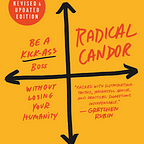The Pernicious Problem With Politeness at Work
Growing up as the daughter of “The Manners Lady,” I was always observant of social norms and expectations. And yet, being constitutionally allergic to authority, I sometimes questioned arbitrary, capricious, and superficial niceties.
In some ways, I wrote my book, The Soul of Civility: Timeless Principles to Heal Society and Ourselves (available 10/10/23) to help me answer questions I’ve had my entire life about why we do things the way we do them.
Despite my mistrust of rules of etiquette, I found that my mother’s promise — that these rules would smooth over our interactions with others and lead to friendships, success, and happiness — came true.
The polish of politeness gave me a slight advantage in school, work, and life in general.
The rules worked well for me.
Until they didn’t.
What Ruthlessness & Politeness Have In Common
When I moved to Washington, D.C., and took a job in politics, my confidence in politeness was shaken.
I observed two extremes in how people interacted with one another: punishing ruthlessness or extreme politeness.
The first contingent is what Kim Scott, Radical Candor author and co-founder, would call Obnoxious Aggression — those whose communication tends toward brutal honesty.
Then, on the other hand, there were those who engaged in what Kim might refer to as Manipulative Insincerity — being nice to your face but talking about you behind your back.
At first, I thought these two modes were opposites, two poles on the spectrum.
But I learned that instead, they were two sides of the same coin: both originated from a dark place in the human spirit — a place where people are willing to instrumentalize and use others as means to their own selfish ends.
While some — usually the younger, greener politicos — chose to be overly aggressive and hostile, the seasoned political operators were cleverer.
They knew that overt aggression would only take them so far. They instead used politeness as their weapon of choice. This allowed them to shroud their opportunism in the appearance of altruism, disguising their true aims while disarming their opponents.
But I soon came to realize that, for them, the rules were merely a tool of self-aggrandizement. They sabotaged anyone who threatened their goals.
I was confused. I heard my mother’s words echo in my ears: “Manners reflect our inner character.” And yet I was surrounded by people who were polished and well-mannered enough, but also ruthless and cruel.
2 Things I Realized About Well-Mannered Cruelty
First, aggressive hostility (Obnoxious Aggression) and duplicitous politeness (Manipulative Insincerity) are two sides of the same coin. They both instrumentalize others.
Instead of seeing them as ends in themselves, they see others as pawns to be bowled over or manipulated for personal gain.
Second, there is an essential difference between civility and politeness.
Civility is a disposition, a way of seeing others as beings endowed with dignity and inherently valuable.
Politeness, by contrast, is a technique: it is decorum, mores, and etiquette. Politeness, the thing that manners and mores serve, is neither good nor bad in itself. It can be used for good or for ill depending on a person’s inner motivation — depending on whether they’ve adopted the disposition of civility.
At its best, the form of politeness can help mitigate the awkwardness, discomfort, and annoyance inherent in social life — but it will only ever apply surface-level fixes, and will never be enough to help us navigate our profound and important disagreements.
Civility maps on to Radical Candor because it demands that we respect others enough to tell them hard truths.
At its worst, politeness makes difference and disagreement worse by fostering feelings of selfishness, pride, and superiority over others. Politeness, like Manipulative Insincerity, can be and has been weaponized to penalize difference, oppress vulnerable populations and voices, and silence dissent.
Civility requires rediscovering a general regard for our fellow persons and citizens. It demands that we revive the basic respect we’re all owed and that we owe to one another, in light of our shared moral status as members of the human community.
At work, at home, and at life in general, it’s easy to rely on politeness to get by. But it’s not enough. Sometimes, respecting others requires telling hard truths. It requires fighting for civility, and not settling for politeness.
Next time you’re in a fraught work context, ask yourself: am I being polite or civil here? Am I truly respecting someone — and myself — by being candid? Or am I polishing over differences to protect myself or hoping to spare someone’s feelings?
Am I choosing insincere politeness?
Or am I choosing Radically Candid civility?
Alexandra Hudson is a writer, speaker, and adjunct professor at the Indiana University Lilly School of Philanthropy. The Soul of Civility: Timeless Principles to Heal Society and Ourselves, is her first book.
